
The Business of Fashion
Agenda-setting intelligence, analysis and advice for the global fashion community.

Agenda-setting intelligence, analysis and advice for the global fashion community.
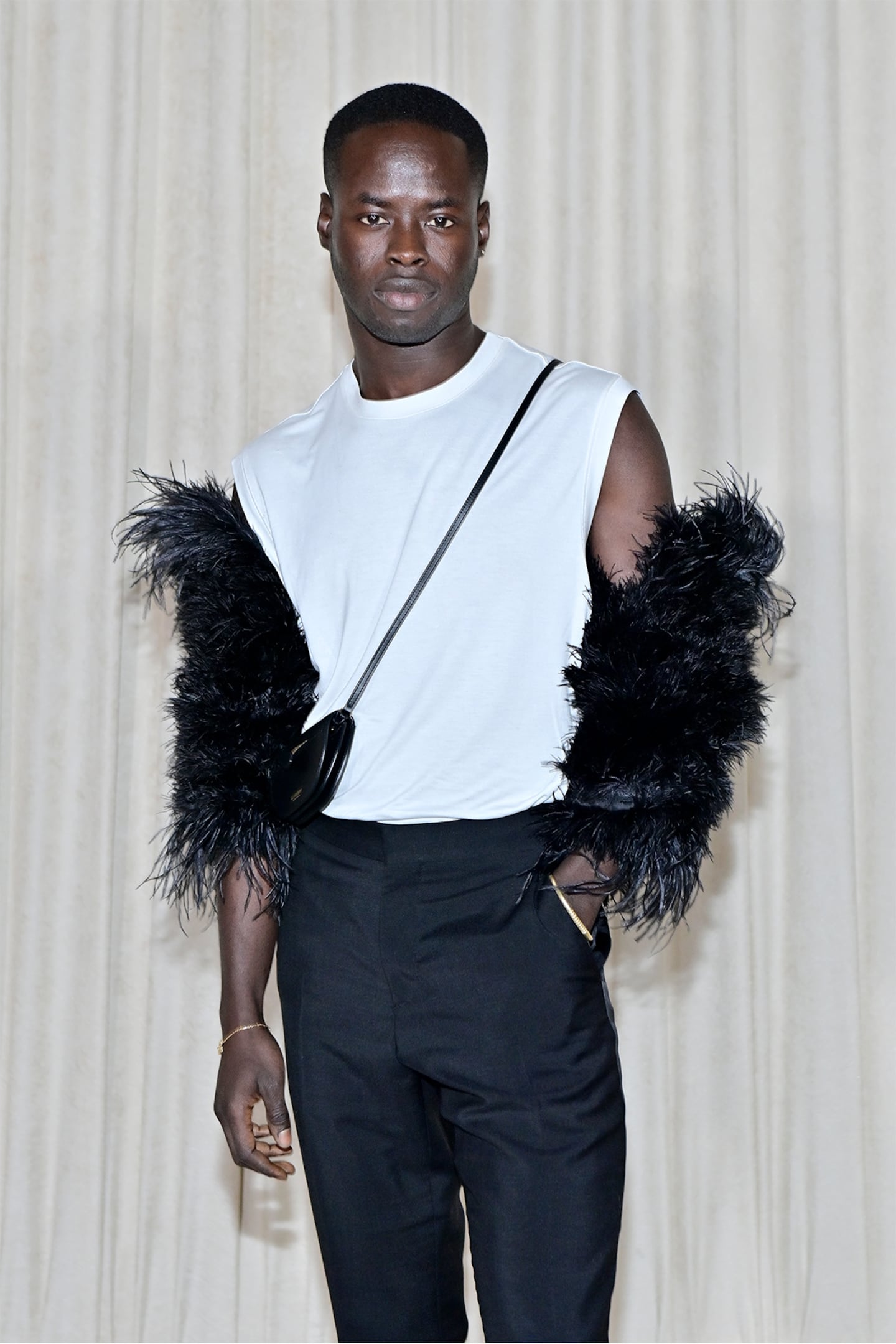
“It’s like ruining a great Renaissance painting to rein Ib in,” Virgil Abloh once said.
That acknowledgement of his stylist Ibrahim Kamara’s impact on the look of Abloh’s menswear collections for Louis Vuitton was appropriately over the top. After Ib climbed aboard the Virgil train in 2020, the clothes became infused with a spirit of heroic masculinity. The presentations matched them by growing grander but more focused. There were stories told in ravishing colour. And there were hats … lots of hats.
Erdem Moralıoğlu, another designer who’s benefited from Kamara’s magic touch, confirmed that particular signature. “We started with five hats, finished with 35,” he recalled of one of his Kamara-styled shows. “To have a hat on every single girl, that was the full-on-ness of working with Ibrahim.”
So it wasn’t hard for those who’d been following Kamara’s sensational career in styling to sense the influence his aesthetic had in Virgil’s world. Indeed, it was inescapable in “Ebonics,” the film Abloh produced for Louis Vuitton’s Autumn/Winter 2021 menswear.
ADVERTISEMENT
Ib was there from the beginning, working with the vintage research, styling it to create a story, cutting and pinning things, moving a jacket this way, sweeping it that way, putting ideas together, bringing a feeling. Doing what a stylist does, in other words. “This is the first time the clothes were designed first, and we put the collection together afterwards,” said Abloh. It showed: Virgil’s Vuitton made linear sense, at last.
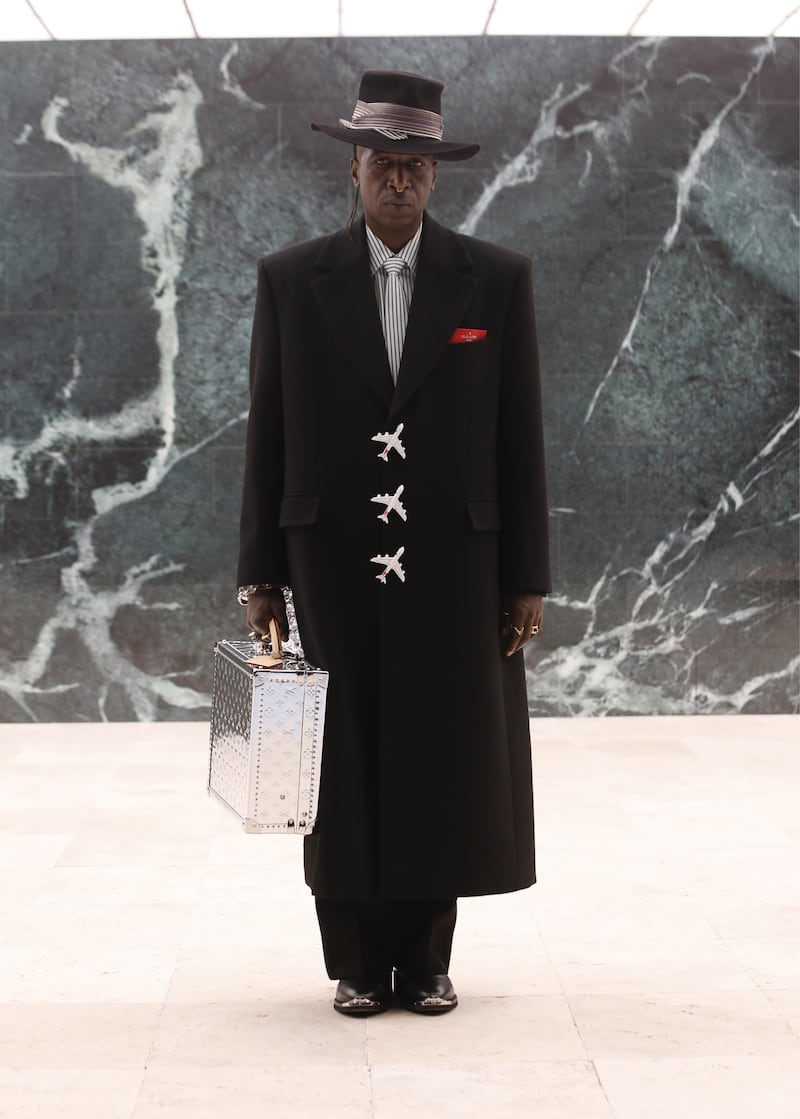
Taking credit for any of that isn’t in Kamara’s nature. But Abloh, who died in November 2021, would surely be happy that Off-White, the luxe streetwear brand he founded with New Guards Group, is now in Ib’s hands. (Vuitton would have been equally interesting, but apparently that conversation never happened.)
The Off-White appointment felt curiously inevitable. Abloh unwittingly recognised as much when he mentioned the Renaissance. Like Abloh, Kamara is a multi-tasking Renaissance man. In addition to his responsibilities at Off-White, he is continuing with his styling work (Vuitton included), making music and short films, designing furniture and, since January, editing Dazed, the venerable British style bible which, under his eye, is a re-energised global gazette.
“The National Geographic of youth culture” is how Dazed co-founder Jefferson Hack pitched it to Kamara when he offered him the job. The position is, in a way, coming full circle for Kamara. While he was still a student at London’s Central Saint Martins, Dazed Digital featured him in a story. Post-grad, he worked as a junior fashion editor for the magazine.
Even with a career that spans several of the most exciting decades in magazine publishing, Hack says he feels privileged to work with Kamara: “He represents a new era in fashion and youth culture. More global, more diverse, more open to an interdisciplinary way of thinking.”
Under Ib’s leadership, Dazed has commissioned stories, both written and visual, from maybe 20 countries in the last few issues. Many of the photographers are shooting stories for the first time. “The most interesting thing for me,” Hack marvels, “is how generous Ib is with the creative network around him. Something he and Virgil had in common is an incredible humility, a way of allowing other people to have space within the collaboration.”
“Collaboration” could be Kamara’s favourite word. It’s how the best things in his life have come to him. In September 2018, he collaborated on an exhibition in New York with South African photographer Kristin-Lee Moolman and British designer Gareth Wrighton (now art director of Dazed), a classmate from Saint Martins. “Soft Criminal” explored African creativity in a set of surreal, cinematic images. In São Paulo, a young photographer named Rafael Pavarotti was stunned by what he saw of “Soft Criminal” online, and even more amazed when Kamara tracked him down on Instagram after seeing his work. One email later, Ib offered Raf a job shooting for Le Monde’s M magazine in Ghana. Visa issues thwarted the project, but a couple of months later, Kamara proposed they shoot in Brazil, somewhere that had personal significance for Pavarotti. That was obviously his home village in the Amazon. Ten days, two shoots; one for Vice-backed i-D, the other for Parisian publication Double.
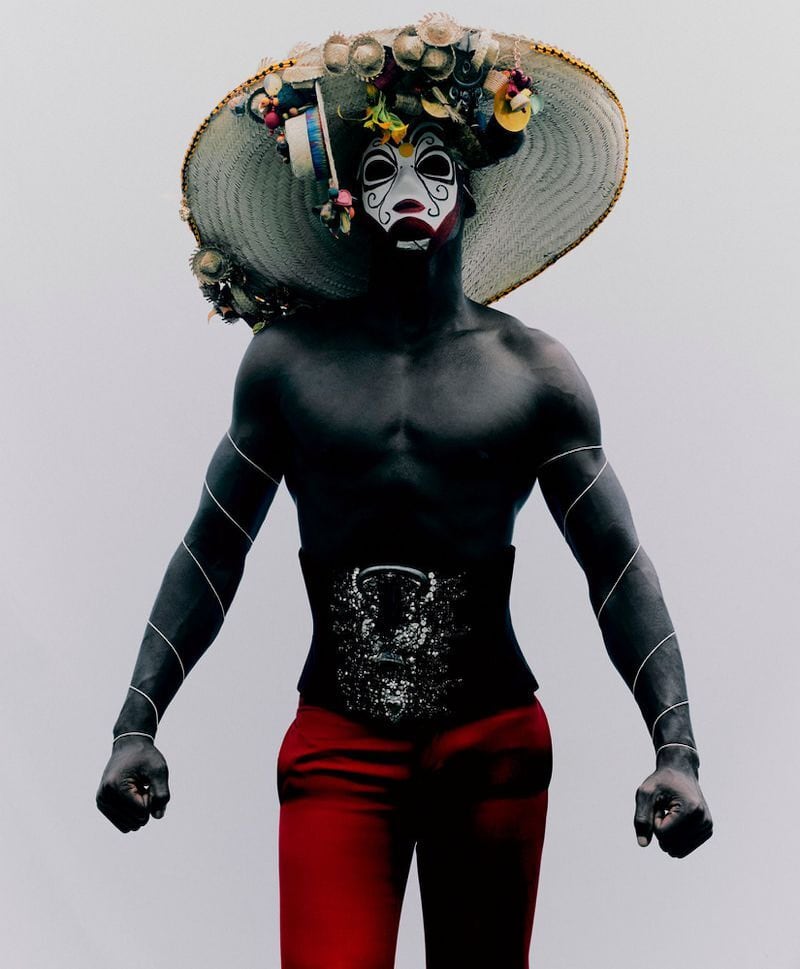
“I’d already been working in fashion for 12 years,” says Pavarotti, “and I’d never had that connection with my own work. I’d learned to never look to myself. But working with Ib, I learned that it’s about our story, our life.” The only English word the duo shared was “Hi.” They communicated through Google Translate. Still, they forged an incredible connection without a common tongue, and Kamara invited Pavarotti to Europe.
ADVERTISEMENT
“Everything happened so quick,” Pavarotti recalls. There followed a string of extraordinary editorials for Vogue Italia, along with advertising campaigns for Burberry and Hermès. In fact, the team of Ib and Raf had an impact on fashion as transformative as photographer Nick Knight and stylist Marc Ascoli’s collaboration in the ‘80s.
Pavarotti describes an almost mystical process when they work together. “We are dreamers, both Geminis. We like to sketch first, and sometimes we forget to look at the sketch. On set, it’s not the position that I’m the photographer and Ib is the stylist. I might go to the clothes and I’ll say, ‘Ib, you go and click.’ We don’t understand what’s happening, it’s like we’re channelling something. But we need a whole community to make this happen. It’s not just about us. We are every time aware of every person around us.”
The sense of family, and the intimate, often funny stories families share, is strong in the work that Kamara and Pavarotti have produced. The Christmas 2021 issue of Vogue Italia happens to be on the table beside me. It’s titled Memories. “The brief was interesting,” says Kamara. “A joyous Christmas cover with Maty [Fall Diba] and her two friends. So I thought let’s have three Black girls running around in a mansion somewhere in England. It’s a dream that most of us never get to experience and I wanted that in the picture. I felt like those girls were my sisters in their Sunday best. And it was me trying also to pull back and tell a story, letting the styling marinate with the picture. It’s about the picture, not so much the style.”
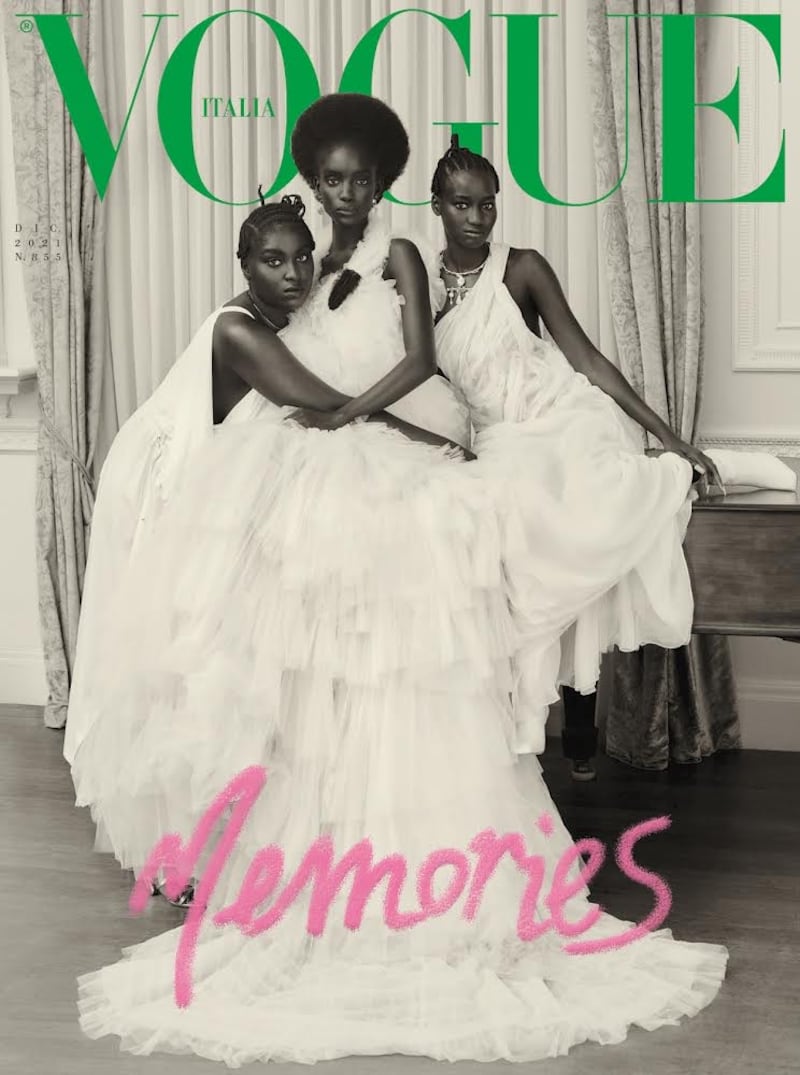
“I’m obsessed with 1960′s black-and-white pictures right now,” Kamara continues, “like when Black photographers used to document kids in Harlem, when people started to take photos for themselves, easy photos just to document their lives. It was all black and white. I can look at those for hours and just imagine stories and scenarios.”
It’s a switch from the jewel-toned palette that is a signature of Kamara’s collaboration with Pavarotti. “But one of the things that helped me the most is I don’t limit my mind to one space. I’m very lucky to be able to envision things and people and bring them to life. And I rely on imagination. Also where I’ve come from really helped me. My story, my background, my family, my upbringing. I grew up relying on my imagination because I didn’t have access to many things. So, I had to imagine them.”
Some of Kamara’s most vivid memories from growing up in Sierra Leone are of the street parades that were a legacy of the country’s colonial past. “People had nothing but were able to imagine the craziest sculptures and lanterns and costumes. I was fascinated watching what my uncles and aunties would wear to go clubbing. And I wanted to be part of that close crew because they were so creative.”
But at home he was also glued to CNN, again from a very young age, and that was a portal to another planet. Not one that reflected his own environment at all, though Kamara never considered that. Instead, he was fascinated by CNN host Larry King and his guests, Oprah, Michael Jackson, avatars of otherworldliness. “We didn’t have many other options,” he says drolly, certainly nothing fashion-related. There was a local cinema though, where the kids would gather to watch Rambo and Robocop. Around them, a civil war raged.
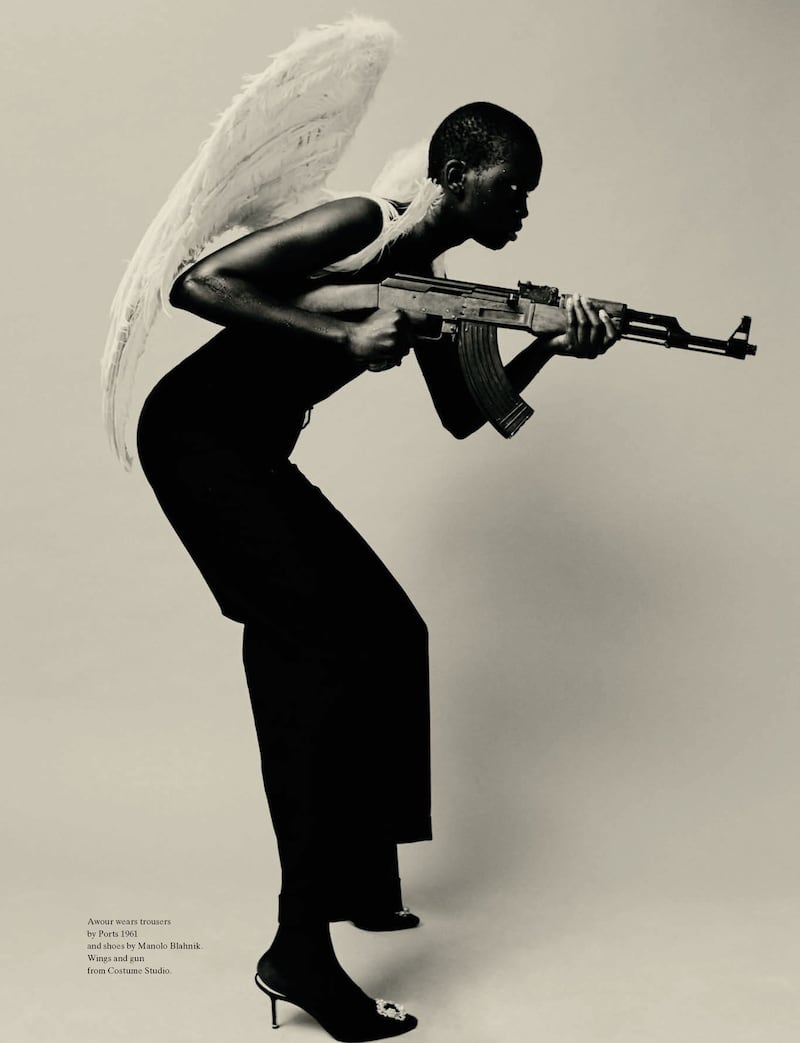
Thousands of children were conscripted by both sides in the conflict. The violence was horrifying. “I lost friends,” Kamara says. “Our house got bombed. I saw dead bodies on the street. I saw guns.” He, too, could easily have been a child soldier. “But everyone in the neighbourhood loved my dad and when they came to attack us, some of the boys who had joined the crew knew him.” So Kamara’s family was spared. As the situation in Sierra Leone worsened, they eventually fled to neighbouring Gambia. Kamara was seven. He remained there with his uncle and aunt while his parents continued on to England.
ADVERTISEMENT
There has been a military subtext in his work through the years, an incongruous suggestion of suppressed violence amongst the ravishing beauty of the images he’s shaped. “I use it a lot in my work because that’s what I saw,” he says, “though I’ve never really talked about the war in Sierra Leone. But yeah, that’s my way of processing it. It’s almost like a defence when I use a gun in my work. Guns can either hurt or protect, and at that point in Sierra Leone, you just had to defend yourself because those rebels were out of control.”
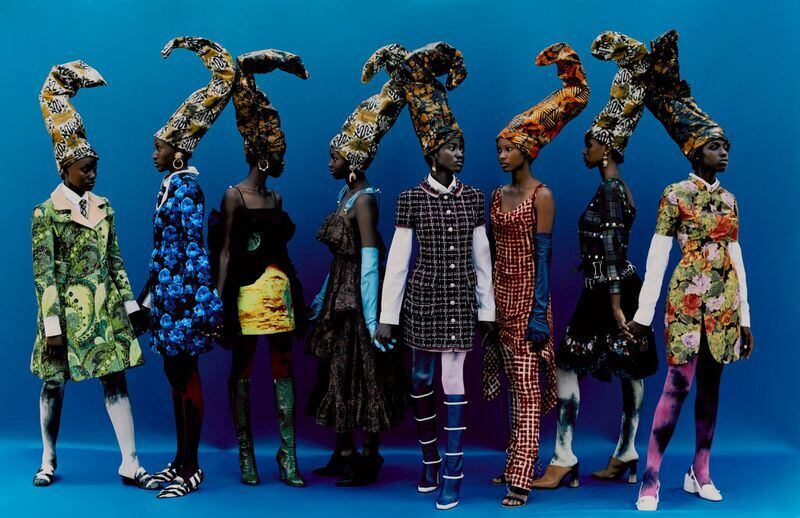
Still, even after all this time, Kamara calls Sierra Leone home. He’s been back twice, including one trip where he shot for i-D with Pavarotti. For all those other memories, it felt good to see familiar places and faces. “Even to see how we can maybe make home better,” he adds. He talks of creating a foundation, funding schools and social programmes for art education. But I’m wondering about Kamara’s other experiences in notoriously homophobic West Africa. “You know, everyone knows about that little gay boy in the village and everyone embraces that person,” he sighs. “It all boils down to this religion that was imported. Religion has scarred us in a way. I think a lot of young Black Africans are trying to tear away.”
But coming out was difficult for him. “I knew I was different from the age of five, six or whatever. To hold that secret till you’re 23 is a long time to hide and to pretend.” He was bullied both for being Black and effeminate. “When I finally came out, I was the free-est thing in the world, because there was no one else to bully me.” Kamara’s mother was bitterly disappointed, however, doubly so because the family intended him to study science, and fashion struck them as a hiding to hell. There were several years of estrangement. “Then I could do whatever the hell I wanted, go wherever I wanted to go. I went clubbing all the time, Loverboy, PDA … I found my confidence. And once I had those people that were always gonna have my back, they became my family, and everything else was irrelevant to me.”
Kamara’s story, personal and professional, puts him at the front of the wave of Black creatives who have changed the face of fashion, quite literally. He sounds a little conflicted by the notion of being a “role model,” and not just because of how shy he insists he is. “I’m a person of colour but I don’t like to rely on my story to exist in a space. I like for the work to be what you took from it. Sometimes I feel like young designers coming into the space use their personal stories and they really will latch on to that too much.”
At the same time, Kamara also acknowledges, “I’m most happy when people feel like they’re inspired by how I live my life. The whole point of me existing in the space is to inspire.” His church is broad: “Apart from my race and my sexuality, I come from extreme poverty and many white kids and Asian kids come from extreme poverty. I have an immigrant story, an outsider story and that resonates and inspires a generation of people who feel like they are outside but still hope to be in.”
At 32, Kamara is mid-stream Millennial, but Gen-Z is his real generational cohort at Dazed where the magazine’s covers are his current obsession. “I’m no longer thinking as a stylist, I’m thinking as an editor. I want to be able to create visuals that can educate and generate a conversation. That’s my mentality because I grew up watching CNN.”
He mentions the legendary London magazine Nova, I chime in with Benetton’s Colors, both publications constantly courting cover-generated controversy in their heyday. Kamara already encountered that with his first cover for Dazed, which depicted a young Black guy getting a Covid vaccination. “Anti-vaxxers weren’t having it at all,” he says. “I got so many nasty DM’s. But I thought at least we were able to have a conversation and hopefully encourage young people to go out and get vaccinated.”
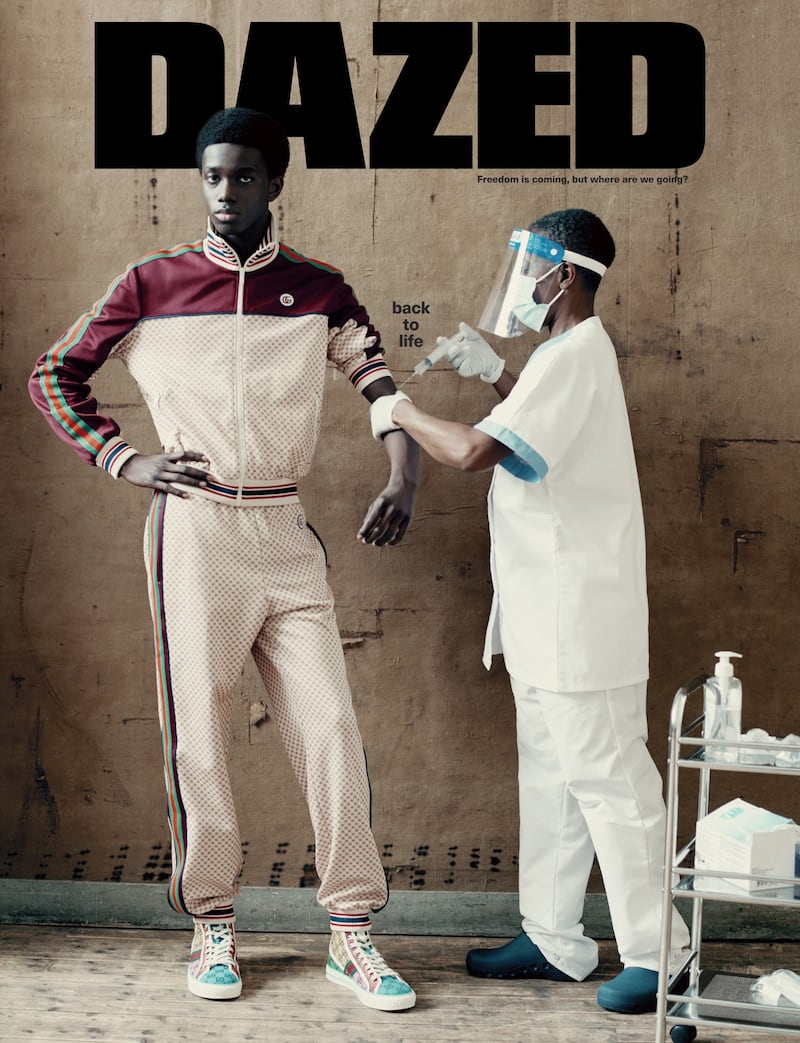
One quirk he arrived at Dazed with was an aversion to celebrity covers. “I don’t care how famous they are. If they don’t do anything that I think benefits the community or has a point of view, I don’t care.” The instantly meme-worthy appearances of, among others, bike boy Harry Styles and Rihanna styled as a blunt suggest he’s made his peace with the idea. “I’d still rather not, but I have to. My audience loves them, they react to them, so I have to find ways to communicate that to Gen-Z in my own way.
Unsurprisingly, Jefferson Hack is thrilled. “You can see Ib’s impact on culture by the speed with which his ideas are copied.” That immediate resonance is something Kamara shares with Virgil Abloh. “The free-est thinking Black man I’ve met in this world,” he calls him. “He could do whatever he wanted. And that is a freedom that is not usually affiliated with people like us.” Kamara realised how quickly Abloh had crossed into mass culture when he was travelling in Ghana and saw the Off-White knock-offs in all the markets there.
“I think fashion can be a tool that can alter the way people see the world,” says Ib, the true believer. I sense his dream would be an empowering dialogue between an activist brand — whether that’s Dazed or Off-White — and a young clientele that continually challenges its agenda. Which makes his nursing Virgil’s baby an exciting prospect. But at this particular moment, I’m most curious about Kamara’s plans for the couture that dominated so much of Abloh’s final collection for Off-White. In hindsight, there was something heartbreaking about the too-muchness of it — a man with too many ideas and too little time. “He was so brilliant, and for me, the saddest thing is all those ideas are in the grave,” says Kamara. But in terms of a protean idea generator, Abloh couldn’t wish for a better successor.
Here’s one reason why: Ib Kamara’s way with a hat is already the stuff of fashion legend, so it makes sense that Rei Kawakubo engaged him to design some headgear for one of Comme des Garçons’ lockdown shows in Tokyo. “Bones” was her cryptic brief. “So I designed a whole collection to go with the hats,” Ib chuckles. “I think it was too much. It was just too cheeky.” He shows me sketches, re-interpreted from his original drawings by Gareth Wrighton. They’re sensational: sci-fi skeletons, fish bones, clothes by H.R. Giger via Hellraiser. “It’s just a concept, it’s not commercial, it’s gonna take years to make,” he adds. “But I eventually want to send this down a runway as a couture show.”
As extreme as this vision for the future is, it also helps to define Kamara now. “I’m trying to learn how to edit, how to work one idea through to the end. Even with this thing I just showed you, there are only two things I have to work with — the bones and the flowers. I don’t want to think of anything else, just those two things, and how far I can push them. That’s the state I’m in.”
The label has been without a creative director since the death of Virgil Abloh in November 2021.
Ibrahim Kamara will take the reins as editor-in-chief at the British youth culture bible, as Isabella Burley steps down. Lynette Nylander has been named executive editorial director.
The renowned stylist and fashion director talks to BoF’s Editor-at-Large Tim Blanks about his time creating under lockdown.
Executives at New Guards Group and LVMH reveal exclusively to BoF the ‘endless’ pipeline the designer left behind and their plans to harness his legacy to build a multi-billion-dollar brand.
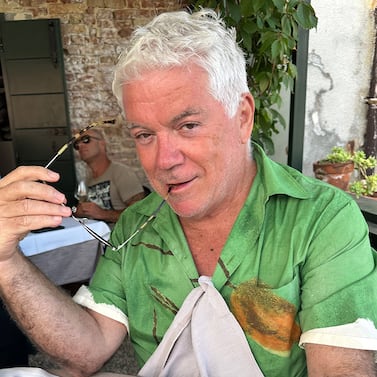
Tim Blanks is Editor-at-Large at The Business of Fashion. He is based in London and covers designers, fashion weeks and fashion’s creative class.
Willy Vanderperre speaks to Tim Blanks on more than 30 years of fashion photography and his life-long fixation with youth culture.
Next week, MoMu, Antwerp’s fashion museum, will unveil a major exhibition celebrating the work of Belgian photographer Willy Vanderperre.
In an exclusive extract from her new memoir ‘How to Make Herself Agreeable to Everyone’ the model and activist examines the dark side of the industry — and her complicity in it.
Brand architect and art director joins BoF founder and editor-in-chief Imran Amed to discuss the philosophy that underpins his groundbreaking retail and hospitality concepts.